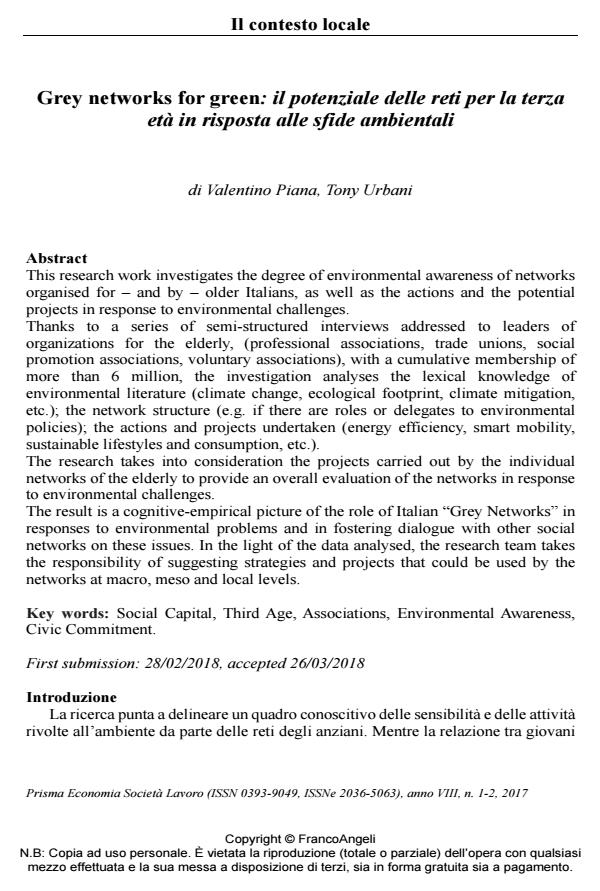Grey networks for green: il potenziale delle reti per la terza età in risposta alle sfide ambientali
Journal title PRISMA Economia - Società - Lavoro
Author/s Valentino Piana, Tony Urbani
Publishing Year 2018 Issue 2017/1-2
Language Italian Pages 15 P. 54-68 File size 245 KB
DOI 10.3280/PRI2017-001005
DOI is like a bar code for intellectual property: to have more infomation
click here
Below, you can see the article first page
If you want to buy this article in PDF format, you can do it, following the instructions to buy download credits

FrancoAngeli is member of Publishers International Linking Association, Inc (PILA), a not-for-profit association which run the CrossRef service enabling links to and from online scholarly content.
This research work investigates the degree of environmental awareness of networks organised for – and by – older Italians, as well as the actions and the potential projects in response to environmental challenges. Thanks to a series of semi-structured interviews addressed to leaders of organizations for the elderly, (professional associations, trade unions, social promotion associations, voluntary associations), with a cumulative membership of more than 6 million, the investigation analyses the lexical knowledge of environmental literature (climate change, ecological footprint, climate mitigation, etc.); the network structure (e.g. if there are roles or delegates to environmental policies); the actions and projects undertaken (energy efficiency, smart mobility, sustainable lifestyles and consumption, etc.). The research takes into consideration the projects carried out by the individual networks of the elderly to provide an overall evaluation of the networks in response to environmental challenges. The result is a cognitive-empirical picture of the role of Italian "Grey Networks" in responses to environmental problems and in fostering dialogue with other social networks on these issues. In the light of the data analysed, the research team takes the responsibility of suggesting strategies and projects that could be used by the networks at macro, meso and local levels.
Keywords: Social Capital, Third Age, Associations, Environmental Awareness, Civic Commitment.
- ADA-UIL Pensionati-Legambiente, Protocollo d’Intesa, (2012), -- http://www.adanazionale.it/wp-content/uploads/2011/10/accordolegambiente.pdf.
- ASPA, (2013) Report Summary Final Report Summary - ASPA (Activating Senior Potential in Ageing Europe) -- http://www.aspa-eu.com
- Auser, (2012) II Rapporto sulle condizioni sociali degli anziani in Italia, a cura di D. De Pretto, F. Montemurro, G. Mancini, L. Morosini.
- Birbes C., (2014) Progettare l'educazione per lo sviluppo sostenibile: idee, percorsi, azioni, EDUCatt - Ente per il diritto allo studio universitario dell'Università Cattolica.
- Bisogni M. M., Piana V., Urbani T., (2011) I giovani e il mondo che cambia, Roma, Anicia.
- Caimi L., (2006) Coscienza ambientale e educazione alla legalità, Vita e Pensiero.
- Cannavò L., Frudà L., (2007) Ricerca sociale. Dal progetto dell’indagine alla costruzione degli indici, Roma, Carocci.
- Ferlander S., (2007) The importance of different forms of social capital for health, Acta sociologica, vol. 50, n. 2, pp. 115-128.
- Golinelli M., La Rosa M., Scidà G., (2006) Il capitale sociale tra economia e sociologia, Milano, FrancoAngeli.
- Ires, Mirabile M.L., De Sario B., Sabbatini A., (2010) Il capitale sociale degli anziani. Stime sul valore dell’attività non retribuita, Roma, Liberetà.
- Ires, Mirabile M.L., De Sario B., Sabbatini A., (2012) Il capitale sociale degli anziani. Volontari e nonni come creatori di benessere: potenzialità, opportunità, limiti dall’analisi di sei studi di caso, Roma, Liberetà.
- Istat, (2014) Tendenze Demografiche e Trasformazioni Sociali, Nuove Sfide per il Sistema di Welfare, Capitolo 4, Rapporto annuale 2014.
- Istat, (2017) Rapporto annuale 2017, -- https://www.istat.it/it/archivio/199318.
- Jackson T., (2017) Prosperità senza crescita. I fondamenti dell’economia di domani, Milano, Edizioni Ambiente.
- Meadows D., Randers J., (1992) Oltre i limiti dello sviluppo, Milano, Il Saggiatore.
- Ministero dell’Ambiente, (2017) Raccomandazioni degli Stakeholder del Tavolo Mobilità Sostenibile, -- http://www.minambiente.it/sites/default/files/archivio_immagini/comunicati/20170524_rseraccomandazioni_roadmap-edit-6_1.pdf.
- Portes A., (1998) Social Capital: its Origins and Application in Modern Sociology, Annu. Rev. Sociol.
- Putnam R.D., (1993) La tradizione civica nelle regioni italiane, Milano, Mondadori.
- Roberti G., (2015) Giovani consumatori o giovani cittadini? Analizzare il consumo responsabile in un’ottica di cittadinanza, Culture della Sostenibilità.
- Urbani T., (2016) Centri sociali anziani della Tuscia, Catanzaro, Rubettino Editore.
Valentino Piana, Tony Urbani, Grey networks for green: il potenziale delle reti per la terza età in risposta alle sfide ambientali in "PRISMA Economia - Società - Lavoro" 1-2/2017, pp 54-68, DOI: 10.3280/PRI2017-001005